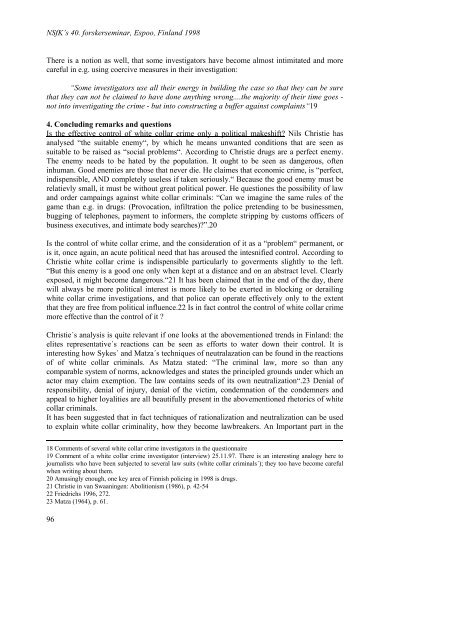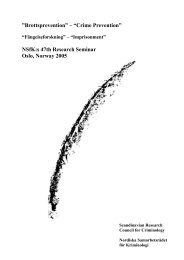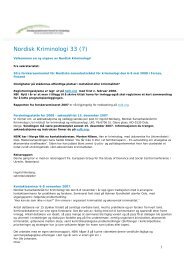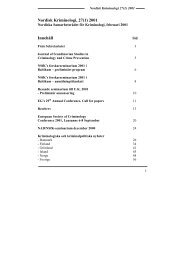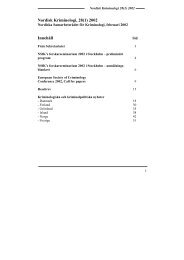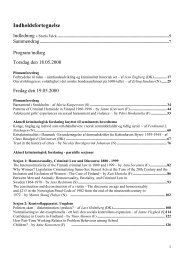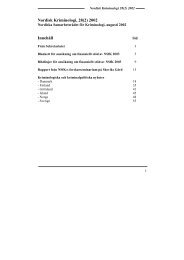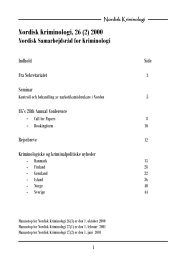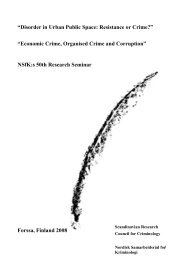Organised Crime & Crime Prevention - what works? - Scandinavian ...
Organised Crime & Crime Prevention - what works? - Scandinavian ...
Organised Crime & Crime Prevention - what works? - Scandinavian ...
Create successful ePaper yourself
Turn your PDF publications into a flip-book with our unique Google optimized e-Paper software.
NSfK’s 40. forskerseminar, Espoo, Finland 1998<br />
There is a notion as well, that some investigators have become almost intimitated and more<br />
careful in e.g. using coercive measures in their investigation:<br />
“Some investigators use all their energy in building the case so that they can be sure<br />
that they can not be claimed to have done anything wrong....the majority of their time goes -<br />
not into investigating the crime - but into constructing a buffer against complaints“19<br />
4. Concluding remarks and questions<br />
Is the effective control of white collar crime only a political makeshift? Nils Christie has<br />
analysed “the suitable enemy“, by which he means unwanted conditions that are seen as<br />
suitable to be raised as “social problems“. According to Christie drugs are a perfect enemy.<br />
The enemy needs to be hated by the population. It ought to be seen as dangerous, often<br />
inhuman. Good enemies are those that never die. He claimes that economic crime, is “perfect,<br />
indispensible, AND completely useless if taken seriously.“ Because the good enemy must be<br />
relatievly small, it must be without great political power. He questiones the possibility of law<br />
and order campaings against white collar criminals: “Can we imagine the same rules of the<br />
game than e.g. in drugs: (Provocation, infiltration the police pretending to be businessmen,<br />
bugging of telephones, payment to informers, the complete stripping by customs officers of<br />
business executives, and intimate body searches)?”.20<br />
Is the control of white collar crime, and the consideration of it as a “problem“ permanent, or<br />
is it, once again, an acute political need that has aroused the intesnified control. According to<br />
Christie white collar crime is indispensible particularly to goverments slightly to the left.<br />
“But this enemy is a good one only when kept at a distance and on an abstract level. Clearly<br />
exposed, it might become dangerous.“21 It has been claimed that in the end of the day, there<br />
will always be more political interest is more likely to be exerted in blocking or derailing<br />
white collar crime investigations, and that police can operate effectively only to the extent<br />
that they are free from political influence.22 Is in fact control the control of white collar crime<br />
more effective than the control of it ?<br />
Christie´s analysis is quite relevant if one looks at the abovementioned trends in Finland: the<br />
elites representative´s reactions can be seen as efforts to water down their control. It is<br />
interesting how Sykes´ and Matza´s techniques of neutralazation can be found in the reactions<br />
of of white collar criminals. As Matza stated: “The criminal law, more so than any<br />
comparable system of norms, acknowledges and states the principled grounds under which an<br />
actor may claim exemption. The law contains seeds of its own neutralization“.23 Denial of<br />
responsibility, denial of injury, denial of the victim, condemnation of the condemners and<br />
appeal to higher loyalities are all beautifully present in the abovementioned rhetorics of white<br />
collar criminals.<br />
It has been suggested that in fact techniques of rationalization and neutralization can be used<br />
to explain white collar criminality, how they become lawbreakers. An Important part in the<br />
18 Comments of several white collar crime investigators in the questionnaire<br />
19 Comment of a white collar crime investigator (interview) 25.11.97. There is an interesting analogy here to<br />
journalists who have been subjected to several law suits (white collar criminals´); they too have become careful<br />
when writing about them.<br />
20 Amusingly enough, one key area of Finnish policing in 1998 is drugs.<br />
21 Christie in van Swaaningen: Abolitionism (1986), p. 42-54<br />
22 Friedrichs 1996, 272.<br />
23 Matza (1964), p. 61.<br />
96


